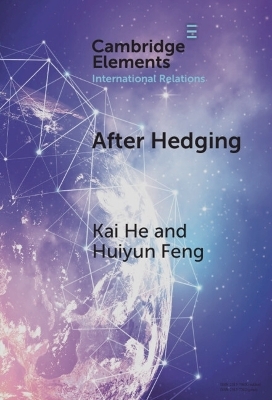
After Hedging
Hard Choices for the Indo-Pacific States Between the US and China
Seiten
2023
Cambridge University Press (Verlag)
978-1-009-46269-3 (ISBN)
Cambridge University Press (Verlag)
978-1-009-46269-3 (ISBN)
This Element introduces a preference-for-change model to explain the policy variations of states during the order transition. It suggests that policymakers will perceive a potential change in the international order through a cost-benefit prism.This title is also available as Open Access on Cambridge Core.
The strategic rivalry between the United States and China has heightened since COVID-19. Secondary states face increasing difficulties maintaining a 'hedging' strategy between the United States and China. This Element introduces a preference-for-change model to explain the policy variations of states during the order transition. It suggests that policymakers will perceive a potential change in the international order through a cost–benefit prism. The interplays between the perceived costs and the perception of benefits from the order transition will shape states' policy choices among four strategic options: (1) hedging to bet on uncertainties; (2) bandwagoning with rising powers to support changes; (3) balancing against rising powers to resist changes; and (4) buck-passing to ignore changes. Four case studies (Australia, New Zealand, Singapore, and Thailand) are conducted to explore the policy choices of regional powers during the international order transition. This title is also available as Open Access on Cambridge Core.
The strategic rivalry between the United States and China has heightened since COVID-19. Secondary states face increasing difficulties maintaining a 'hedging' strategy between the United States and China. This Element introduces a preference-for-change model to explain the policy variations of states during the order transition. It suggests that policymakers will perceive a potential change in the international order through a cost–benefit prism. The interplays between the perceived costs and the perception of benefits from the order transition will shape states' policy choices among four strategic options: (1) hedging to bet on uncertainties; (2) bandwagoning with rising powers to support changes; (3) balancing against rising powers to resist changes; and (4) buck-passing to ignore changes. Four case studies (Australia, New Zealand, Singapore, and Thailand) are conducted to explore the policy choices of regional powers during the international order transition. This title is also available as Open Access on Cambridge Core.
Introduction; 1. International order transition and state policy choice; 2. Preference-for-change model: a neoclassical realist framework; 3. Singapore: hedging to cope with uncertainties; 4. Australia: balancing to resist change; 5. Thailand: bandwagoning to seek profit; 6. New Zealand: buck-passing to avoid risks; Conclusion; References.
| Erscheinungsdatum | 26.09.2023 |
|---|---|
| Reihe/Serie | Elements in International Relations |
| Zusatzinfo | Worked examples or Exercises |
| Verlagsort | Cambridge |
| Sprache | englisch |
| Maße | 152 x 229 mm |
| Gewicht | 230 g |
| Themenwelt | Geschichte ► Allgemeine Geschichte ► Zeitgeschichte |
| Sozialwissenschaften ► Politik / Verwaltung ► Europäische / Internationale Politik | |
| ISBN-10 | 1-009-46269-5 / 1009462695 |
| ISBN-13 | 978-1-009-46269-3 / 9781009462693 |
| Zustand | Neuware |
| Haben Sie eine Frage zum Produkt? |
Mehr entdecken
aus dem Bereich
aus dem Bereich
Gewalt, Umwelt, Identität, Methode
Buch | Softcover (2024)
Spector Books OHG (Verlag)
36,00 €
wie Freud im Kollektiv verschwand
Buch | Hardcover (2024)
Klett-Cotta (Verlag)
25,00 €


